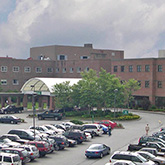Patients can receive echocardiograms, transesophageal echocardiograms (TEE), cardiac stress echo exams and cardiac stress tests close to home from cardiologists at Central Vermont Medical Center in Berlin, VT.
Patients can rely on the highly-skilled, compassionate cardiologists at Central Vermont Medical Center for echocardiograms for screening, diagnosis, and treatment of heart conditions.
Patients with heart conditions often need advanced testing to see what’s going on inside the complex heart chambers, valves, and blood vessels. The cardiologists at Central Vermont Medical Center use leading techniques and devices to provide effective tests in a comfortable environment.
Types of Echocardiogram We Offer
Routine Echocardiogram
An echocardiogram, or ultrasound of the heart, uses sound waves to see your heart’s chambers, valves, walls, and blood vessels. We use echocardiogram images to understand your heart’s structure and function, and the strength of your blood flow.
The test is safe, painless, and takes between 20 and 45 minutes. You don’t need to do anything special to prepare for the test.
Transesophageal Echocardiogram (TEE)
A transesophageal echocardiogram (TEE) records images of your heart from inside the esophagus, or food pipe. Since the esophagus lies just behind your heart, the TEE may provide better images of heart movement than a standard echocardiogram.
The doctor will give you a mild sedative to help you relax. To perform TEE, the doctor will gently insert a flexible tube about the size of your index finger into your mouth and down through the esophagus. At the tip of the tube is a small probe that produces sound waves. These sound waves bounce off your heart and create images of its structures.
Review these special instructions before the test, and talk with your doctor about any concerns:
- The night before a TEE, do not eat or drink anything after midnight.
- Do not take any medications, including vitamins, supplements, and over-the-counter drugs by mouth prior to the exam.
- If you have diabetes, do not take insulin the morning of the exam since you will not be eating that morning.
- Arrange for someone else to drive you home after the test.
- Do not drive or operate equipment for the remainder of the day.
Cardiac Stress Echo Exam
A cardiac stress echo exam helps your physician see before and after images of your heart while at rest and during exercise. The differences help us understand how your heart tolerates physical activity and evaluate the blood flow to your heart.
To prepare for the test:
- Eat a light meal.
- Wear comfortable, loose fitting clothes and shoes that are appropriate for exercise.
- Prepare and bring a list of your medications, the doses, and how often you take them.
Schedule an appointment today. Call 802-371-4283


